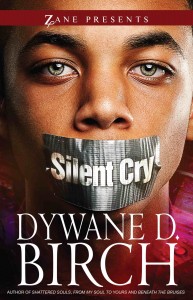There are many things you hope to pass forward to your children someday.
You hope they get their father’s athletic ability and their mother’s business acumen. They’ll need patience from their grandmothers, wisdom from Grandpa, an uncle’s sense of humor and good looks from all sides of the family. Yes, there are material possessions your kids will inherit some day, but the intangibles are what’s important.
And yet, some things don’t need to be passed forward. Those are traits you don’t want your children to get, and in the new book Silent Cry by Dywane D. Birch, you’ll read about one of them.
Every night before he went to bed, fourteen-year-old K’wan Taylor felt beneath the mattress to make sure the knife was still there.
He was tired of hearing his mother’s screams. He was tired of hearing the thumps of his father’s fists on his mother’s face. He was afraid he’d find his mother dead someday, lying at the bottom of the stairs.
K’wan wouldn’t let that happen. That was why he tried to kill his father.
As residential programs went, Healing Souls wasn’t bad. The counselors were nice and K’wan liked his roommate, but he wished everybody would stop trying to make him talk about that night, the blood, the anger he felt. He hated his father, but he couldn’t say how much. He couldn’t say anything, in fact, because words just wouldn’t come out of his lips.
K’wan had been silent for months.
Everybody told him that he’d talk when he was ready, but they pushed him to trust, listen, journal, think, get his anger out in the open, maybe even forgive both his parents. Then one of the counselors, Miss Daisy, gave him a pamphlet and K’wan learned that children who are abused often grow up to be abusers.
There was no way he’d let that happen, either. There was no way he was going to be anything like his father…
Open this book to the first chapter, and you know that Silent Cry is going to try to teach you something. It practically drips with lessons and warnings, and that’s all good. The problem is that it’s also saturated with repetition.
Now, don’t get me wrong. I firmly, indubitably believe that author Dywane D. Birch’s message – that domestic violence is wrong and that it can spill into the next generation way too easily – is something every man and woman needs to know, twice.
But between the pages and pages of identical flashbacks, too-similar-sounding counseling sessions, tired obscenities, interchangeable bursts of anger, and an awful lot of blinking, I thought the message could’ve been hammered home in fewer pages. Silent Cry is just too long.
It’s not unreadable. It’s just wordy, and if you can keep that in mind and don’t get too impatient, you’ll like this book just fine. You might, in fact, have someone in mind while you’re reading and if that’s the case, then look for this book because Silent Cry is one you’ll want to pass forward.
Silent Cry by Dywane D. Birch (Strebor Books, $15, 307 pgs).





